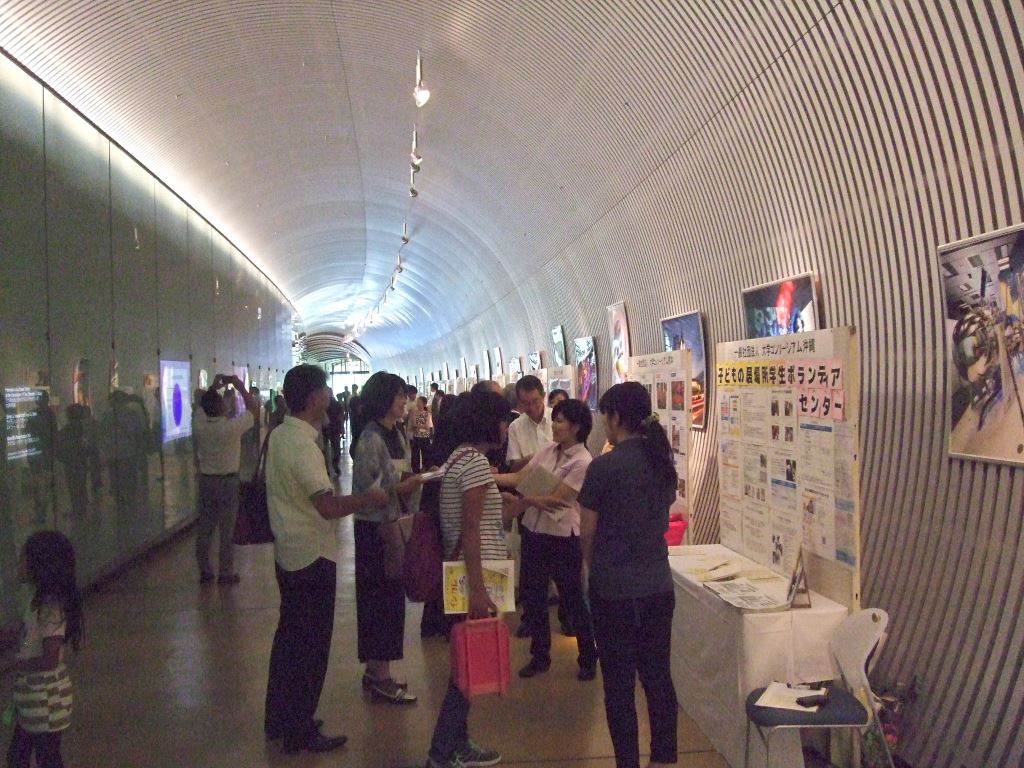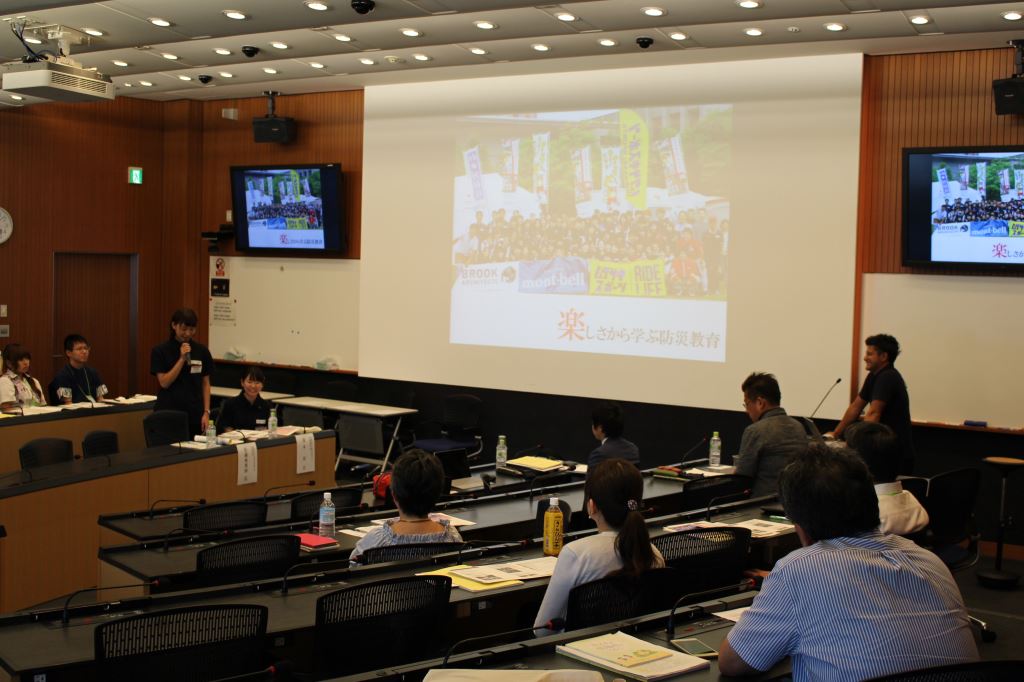Business overview
In order to contribute to the development of higher education, we are exchanging information on the initiatives and research results of each university consortium.
Overview of the 14th National University Consortium Research Exchange Forum
- theme
- University Consortium and Volunteers
- schedule
- Saturday, October 7, 2017 13:00-20:30 (Poster session 12:00-16:00)
Sunday, October 8, 2017 9:30-11:30 - venue
- Okinawa Institute of Science and Technology Graduate University (1919-1 Tancha, Onnason, Kunigamigun, Okinawa Prefecture)
*Free shuttle bus operates from Naha city. Advance reservation is required through the Apollon system. - Co-organized by
- National University Consortium Council
General Incorporated Association University Consortium Okinawa - Content
- The 14th National University Consortium Research Exchange Forum Leaflet

(Day 1)
Keynote Speech: 13:15-14:05
| theme | “Youth Volunteers Promoting World Peace and Development” | |
| keynote speaker | Olivier Adam | Executive Director, United Nations Volunteers (UNV) |
Guest Speaker
Lecture I: 14:10-15:00
| theme | “We all live on Earth” | |
| Speakers | Agnes Chan | Singer/Doctor of Education |
Lecture II: 15:00-15:20
| theme | “The Future of OIST and Japan” | |
| Speakers | Peter Gruss | President, Okinawa Institute of Science and Technology Graduate University |
Symposium: 16:00-17:45
| theme | “University Consortium and Volunteers” | |
| Symposium | Olivier Adam | Executive Director, United Nations Volunteers (UNV) |
| Agnes Chan | Singer/Doctor of Education | |
| Mr. Yasuhide Nakamura | Professor Emeritus at Osaka University, President of the International Society for Volunteer Studies | |
| Mr. Yasumasa Kimura | Representative of the UNICEF Tokyo Office | |
| Mr. Yukihiko Nunomura | Vice Secretary General, Tokyo Organising Committee of the Olympic and Paralympic Games | |
| Kenichi Imai (University Student) |
4th year student at Kwansei Gakuin University, Department of Sociology, United Nations Youth Volunteer | |
Information exchange meeting: 19:00-20:30 (Hotel in Onna Village (to be determined))
(Day 2)
1st Subcommittee (Responsible: University Consortium Okinawa)
| theme | Sustainable Development and Environmental Law and Policy | ||
| Content | “Environmental rights,” “The significance and limits of reconciliation in environmental disputes,” and “Sustainability assessment.” As the burden on the environment increases due to economic development and population growth in urban areas, there is a demand for sustainable development for the present and future generations. I would like to develop discussions to resolve environmental issues and pass on a healthy environment to the next generation. |
||
| Reporter | Mr. Kenichiro Yanagi | Professor, Meiji University Law School | “Sustainability Assessment and Indicators” |
| Mr. Hirokazu Ueda | Assistant Professor, Soka University | “Changes in the debate on environmental rights and the future” | |
| Mr. Koichi Nagashima | Assistant Professor, Teikyo University | “The Significance and Limits of Reconciliation in Environmental Disputes” | |
| coordinator | Mr. Hironobu Asaga | Professor, Soka University | |
| Time Schedule | time | Content | |
| half an hour | Changes in the debate on environmental rights and their future | ||
| half an hour | The Significance and Limitations of Reconciliation in Environmental Disputes | ||
| half an hour | Sustainability Assessment and Indicators | ||
| half an hour | Q&A session | ||
Session 2 (Responsible party: University Consortium Okinawa)
| theme | Human resource development through volunteerism | ||
| Content | Volunteerism is a concept and action to correct social disparities in order to realize a more just society in the world. In this session, we will introduce the two-way beneficial effect of volunteering in the fields of welfare and education (human development of practitioners and beneficiaries) using examples such as the “child poverty” measures being taken by university student volunteers in Okinawa. | ||
| Reporter | Ms. Sumiko Ogawa | Professor, Meio University | “The Potential of Volunteerism” |
| Mr. Makoto Motomura | Professor, University of the Ryukyus | “Volunteerism in Welfare: A Case Study on ‘Countermeasures to Prevent Child Poverty'” | |
| Mr. Akira Yamauchi | Part-time lecturer at Okinawa Women’s Junior College | “Volunteerism in Education: The Case of ‘Kitaka no Amawari'” | |
| coordinator | Ms. Naomi Watanabe (Tamaki) | Lecturer, Okinawa Christian University | |
| Time Schedule | time | Content | |
| half an hour | Report 1: “Potential of Volunteerism” | ||
| half an hour | Report 2: “Volunteerism in Welfare” | ||
| half an hour | Report 3: “Volunteerism in Education” | ||
| half an hour | discussion | ||
3rd Subcommittee (Responsible: University Consortium Okinawa)
| theme | From industry-academia “collaboration” to “co-creation” | ||
| Content | This event will feature experts with experience in industry-academia collaboration from various fields discussing the hurdles that must be overcome to make the results of industry-academia collaboration more colorful and fruitful. This event will also discuss the prospects for developing a platform that can increase the mobility of human resources and allow for more free discussion and research. | ||
| Reporter | Mr. Mitsuji Kashima | Asahi Kogyosha Co., Ltd. Technology Headquarters | “Co-creation in multiple fields through joint research: air conditioning, plant cultivation, pharmaceuticals” |
| Mr. Yuji Nakamura | Tokyo Institute of Technology Future Industrial Science and Technology Laboratory | “Industry-academia collaboration from the perspective of University Research Administrators (URA) (tentative title)” | |
| coordinator | Mr. Mitsuji Kashima | Asahi Kogyosha Co., Ltd. Technology Headquarters | |
| Time Schedule | time | Content | |
| 10 minutes | Coordinator and presenter introduction | ||
| 40 minutes | Presentation by presenter 1 | ||
| 40 minutes | Presentation by presenter 2 | ||
| half an hour | General Discussion | ||
4th Subcommittee (Responsible for: Academic, Cultural and Industrial Network Tama Public Interest Incorporated Association)
| theme | Community service and volunteering | ||
| Content | Network Tama conducts the “Tama-Musashino Exam” with the dual goals of promoting local/lifelong learning and regional development. In addition to the fee-based exam for the general public, the exam is also run as a volunteer project to provide further learning opportunities for those who pass, and is free for children and students to take, creating an opportunity for local research. The “Urban Development Competition” is characterized by the fact that it widely publicizes the students’ practical urban development activities as a reference example for practical education at universities, and asks related municipalities and companies to volunteer as tutors to help the participating students achieve better educational results. By introducing these examples, we will focus on the volunteer activities of Network Tama and position community contribution and human resource development projects as the main mission of university collaboration, and introduce its strengths and challenges. | ||
| Reporter | Mr. Sukehiro Hosono | Executive Director of Tama Academic, Cultural and Industrial Network, Professor at Chuo University | “The Significance and Current Status of Volunteering for the Tama-Musashino Examination” |
| Mr. Sadatsugu Nishiura | Executive Director of Academic, Cultural and Industrial Network Tama, Professor at Meisei University | “The Significance and Challenges of Urban Development Competitions” | |
| Mr. Masato Itohisa | Executive Director of Tama Academic, Cultural and Industrial Network, Associate Professor at Hosei University | “The Community-Wide Campus: Initiatives of Hosei University and the Tama Community Communication Center (HUCC)” | |
| coordinator | Mr. Tadanobu Nemoto | Executive Director of Tama Academic, Cultural and Industrial Network, Professor at Chuo University | |
| Time Schedule | time | Content | |
| 5 minutes | The significance and issues raised by this panel discussion | ||
| 20 minutes | The significance and current status of volunteering for the Tama-Musashino Examination | ||
| 20 minutes | The significance and challenges of urban development competitions | ||
| 20 minutes | A Campus for the Whole Community: Initiatives of Hosei University and the Tama Community Communication Center (HUCC) | ||
| 20 minutes | Issues and prospects for volunteer activities in university collaboration | ||
| 35 minutes | Discussion with the audience | ||
5th Subcommittee (Responsible for: The Consortium of Universities in Kyoto, a Public Interest Foundation)
| theme | Current status and prospects for training student volunteers who can play an active role in times of disaster : Case studies of disaster prevention education in Kyoto and Akita |
||
| Content | We will introduce examples of university-based disaster volunteer training and disaster prevention education in Kyoto and Akita, and consider future support for disaster prevention education and ways of regional collaboration. | ||
| Reporter | Mr. Shinichi Oikawa | Assistant Professor, Department of Nursing and Welfare, Japanese Red Cross Akita Junior College; Chief, Red Cross Disaster Prevention Volunteer Station | “Red Cross Disaster Prevention Camp for Everyone by Akita Prefecture Students and Community Cooperation Initiatives” |
| Mr. Ryoga Ishihara | Lecturer, Faculty of Policy Studies, Ryukoku University | “Developing human resources to take on disaster volunteer duties and the state of university education” | |
| coordinator | Taro Hirowatari | Professor, Department of Nursing, Japanese Red Cross Akita Nursing College Director, Red Cross Community Exchange Center |
|
| Time Schedule | time | Content | |
| 5 minutes | Explanation of the purpose of the event | ||
| 40 minutes | Case study 1: Kyoto | ||
| 5 minutes | Q&A | ||
| 40 minutes | Case study 2: From efforts in Akita | ||
| 5 minutes | Q&A | ||
| 25 minutes | Exchange of opinions and discussions among presenters and participants | ||
- Time schedule and venue
<Day 1> Saturday, October 7, 2017
| time | Content | venue |
| 9:30~10:00 | Reception for those wishing to visit the university (those who have made a reservation in advance) | Lobby in front of the main auditorium |
| 10:00~11:50 | Okinawa Institute of Science and Technology Graduate University tour *Advance booking required through Apollon |
General campus |
| 11:30~13:00 | Forum reception | Lobby in front of the main auditorium |
| 12:00~13:00 | Poster Session | Tunnel Gallery |
| 12:00~12:30 | National University Consortium General Assembly | Location being adjusted |
| 13:00~13:15 | greeting | Large auditorium |
| 13:15~14:05 | keynote speech | |
| 14:10~15:00 | Lecture I | |
| 15:00~15:20 | Lecture II | |
| 15:20~16:00 | Poster Session | Tunnel Gallery |
| 16:00~17:45 | Symposium | Large auditorium |
| 18:00 | <Information Exchange Meeting Participants> Travel to the information exchange meeting (free shuttle bus) *Advance reservations required from Apollon |
<Information Exchange Meeting Participants> Arrival at the venue: (Around 18:30) |
| 18:15 | <Not participating in the information exchange meeting> Travel to a hotel in Naha city or Onna village (free shuttle bus) *Advance reservations are required from Apollon for the free shuttle bus |
<Not participating in the information exchange meeting> Arrival in Naha city: (Scheduled arrival time: 19:00-19:30) |
| 19:00~20:30 | Information exchange meeting | Hotels in Onna Village (currently under review) |
| 20:30 | Transfer to a hotel in Naha city or Onna village (free shuttle bus) *Advance reservation required from Apollon |
Arrival in Naha city: (Scheduled arrival time: 21:30-22:00) |
*Lunch time for participants of the Okinawa Institute of Science and Technology Graduate University tour is 12:00-13:00 (12:30-13:00 for general meeting participants)
<Day 2> Sunday, October 8, 2017
| time | Content | venue |
| 9:00~9:20 | reception | Lobby in front of the main auditorium |
| 9:30~11:30 | Subcommittees (1st to 5th subcommittees) | Each session venue |
| 12:00 | Transfer to Naha city (free shuttle bus) *Free shuttle bus requires prior reservation from Apollon |
Arrival in Naha city: (Scheduled arrival time: 13:00-13:30) |
| 12:00~12:30 | Reception for those who wish to visit the university (those who have made a reservation in advance) *Reservations must be made in advance through Apollon |
Lobby in front of the main auditorium |
| 12:30~14:30 | Visit to Okinawa Institute of Science and Technology Graduate University | General campus |
| 15:00 | Transfer to Naha city (free shuttle bus) *Free shuttle bus requires prior reservation from Apollon |
Arrival in Naha city: (Scheduled arrival time: 16:00-16:30) |
*Lunch time for participants in the Okinawa Institute of Science and Technology Graduate University tour will be from 11:30 to 12:30.
*Please note that the program may be subject to change.
Purpose of the event
The theme of the 3rd University Consortium Okinawa held in 2016 was “Volunteer Spirit.” At the symposium, there was a talk about university students’ participation in UN volunteers, a presentation by the Director of the Japan International Cooperation Agency’s Okinawa Center focusing on the Japan Overseas Cooperation Volunteers, and a local university professor introduced a case study of an educational support project by a university student volunteer organization to combat child poverty, a serious issue currently facing Okinawa. After the symposium, several partner schools expressed a desire to further explore this theme. This time, we would like to realize this desire at the national forum.
”Volunteer Spirit” is spontaneity, non-profitability, and publicness. Among these, “spontaneity,” which is the origin of the word “volunteer,” is an act that is done on one’s own initiative, of one’s own volition. In other words, it refers to not being forced or ordered to do something by others or circumstances. Next, “non-profitability” means that it is unpaid, that is, there is no expectation of economic compensation. However, volunteering itself does not deny the fact that it is paid, and it means that economic compensation is not the purpose of the activity. Furthermore, “publicness” is also called sociability or public interest, and refers to being useful to others or society in some way. Individual issues are transformed into social issues through supporting those who are not directly related to oneself and have no personal interest. In addition, volunteering can cultivate “creativity” in the sense of feeling a sense of fulfillment and self-actualization, and one’s “will to live” through volunteering by connecting with others and feeling their gratitude.
In this way, “volunteer spirit” or “volunteerism” goes beyond individual unpaid activities and one-sided support of others, and has the potential to make society richer and happier. It is important for university students, who will eventually be responsible for civil society, to understand and practice the significance of this in order to improve modern society.
Volunteerism also has the potential to correct various disparities that have arisen between people. Educational disparities such as child poverty, which have become a problem in Japan recently, are mainly due to economic and health disparities within families. Of course, the government and NGOs are working to solve these issues, but will they really be improved just by setting up organizations?
The theme of this national forum has been set as “University Consortium and Volunteers” to allow everyone to think about the impact on society of university consortia, including university students, participating in volunteer activities. The keynote speech will reaffirm the theory of why volunteerism is essential in modern society from a global perspective and the importance of volunteer education at universities, and the symposium will include a discussion with volunteer practitioners. We hope that after participating in this forum, participants will be able to gain hints for future activities, such as what kind of consortium (working toward a common goal) activities are possible for each university, and what kind of collaborative system can be created to allow students at each university to experience the two-way beneficial effects of volunteering on the “practitioner-beneficiary” side.
Implementation Report
The 14th National University Consortium Research Exchange Forum was held over two days, from Saturday, October 7th to Sunday, October 8th, at the Okinawa Institute of Science and Technology Graduate University (Onna Village, Okinawa Prefecture), with the main theme of “University Consortiums and Volunteers.”
A total of 263 people from higher education institutions and government agencies across Japan participated in the event to consider the impact on society of a university consortium, including university students, participating in volunteer activities, and to consider from a global perspective why volunteerism is essential in modern society and the importance of volunteer education at universities.
On the first day, there was a keynote speech by Olivier Adam (Executive Director of the United Nations Volunteer Programme (UNV)), a speech by guest speaker Agnes Chan (singer and PhD in education), and a speech by Peter Gruss, President of the host school, the Okinawa Institute of Science and Technology Graduate University.
- ▽Keynote speech
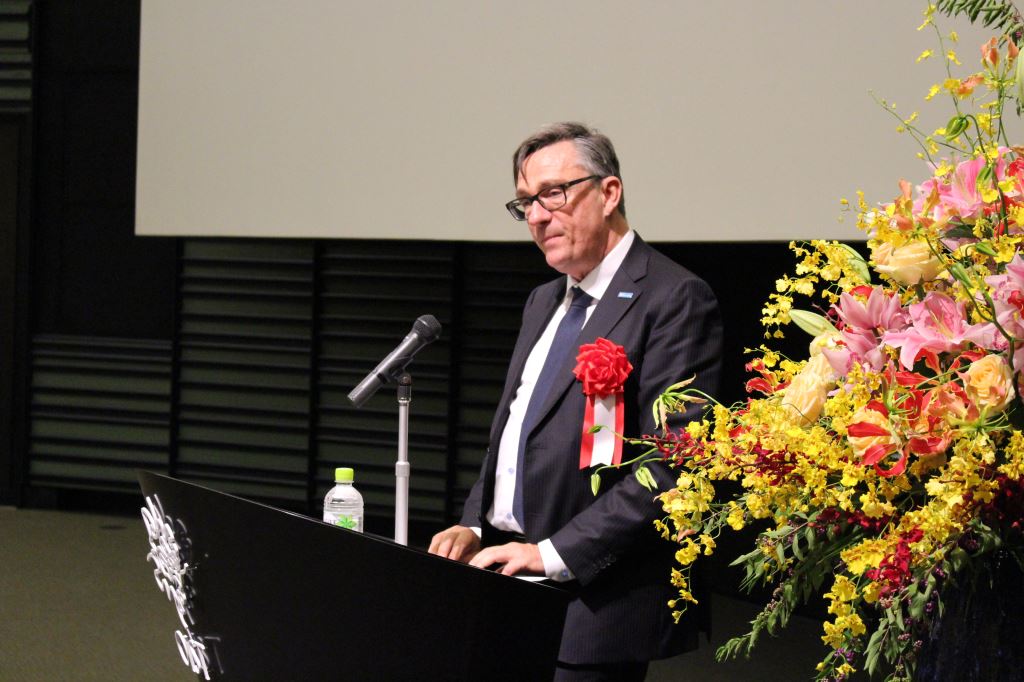
- ▽Lecture I
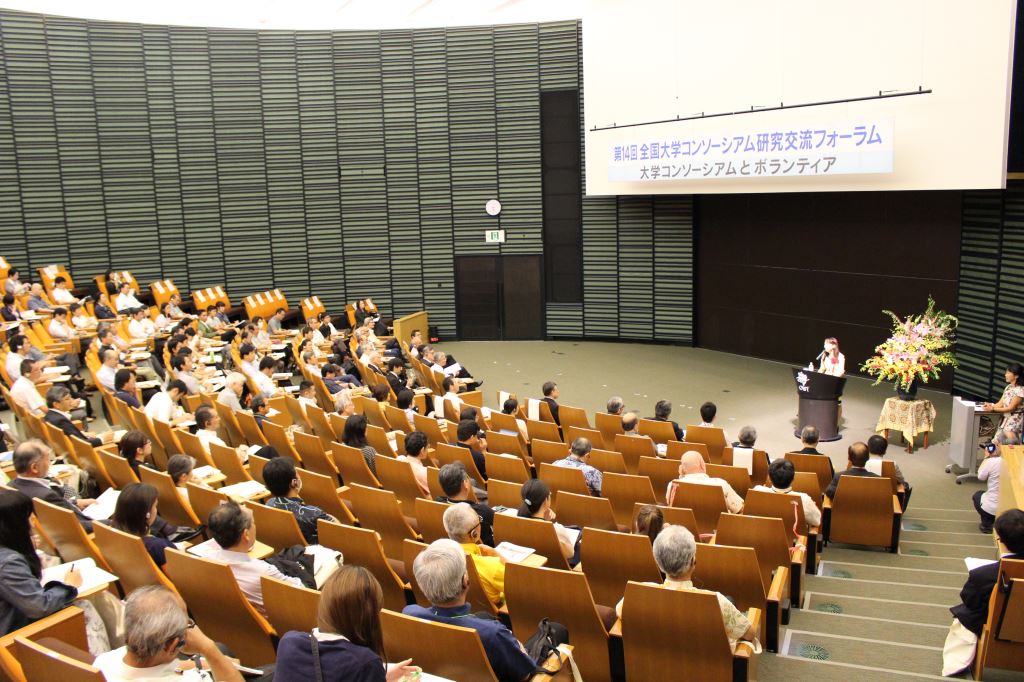
- ▽Lecture II
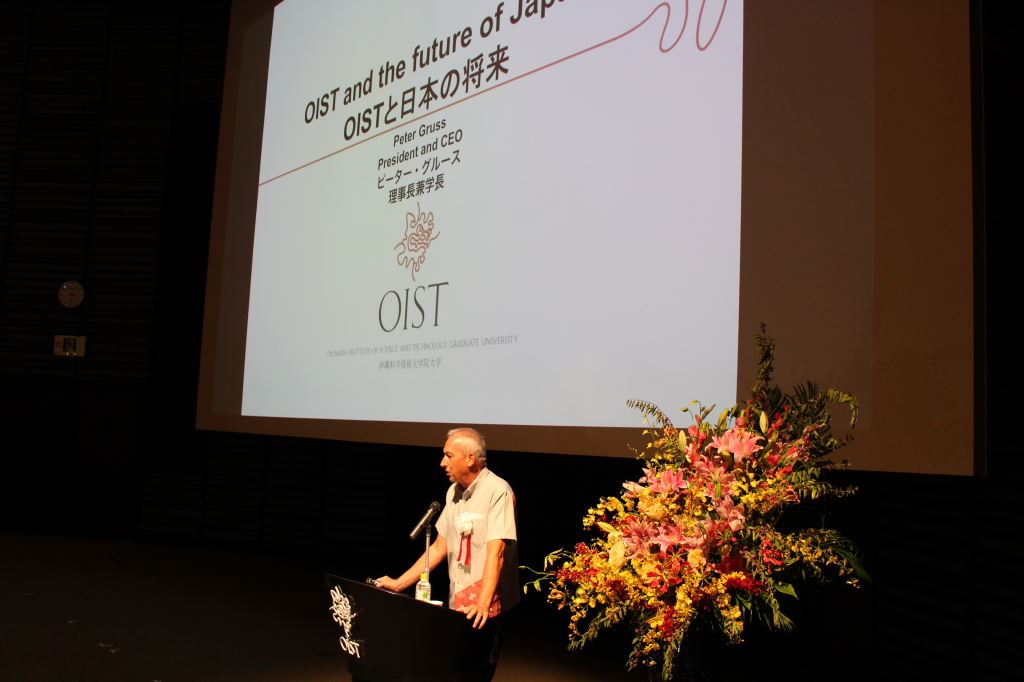
- ▽Scenes from the symposium
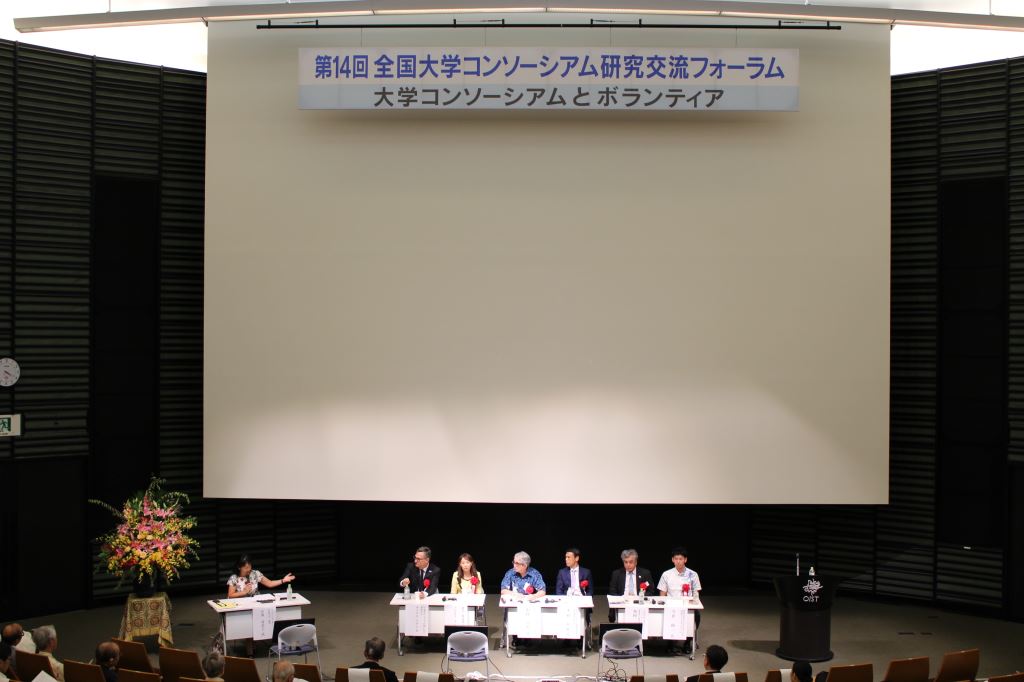
In the symposium that followed, in addition to Olivier Adam and Agnes Chan, volunteer practitioners such as Nakamura Yasuhide (Professor Emeritus at Osaka University and President of the International Society for Volunteer Studies), Kimura Yasumasa (Representative of the UNICEF Tokyo Office), Nunomura Yukihiko (Deputy Secretary General of the Tokyo Organising Committee of the Olympic and Paralympic Games), and Imai Kenichi (4th year student in the Department of Sociology at Kwansei Gakuin University and UN Youth Volunteer) engaged in a lively discussion on the topic of “University Consortiums and Volunteering.”
In addition, during the poster session held in parallel with the symposium, participants asked many questions and gave their impressions about the initiatives of each consortium organization, and there were scenes of active interaction between exhibitors and participants.
- ▽Poster session (18 exhibitors)
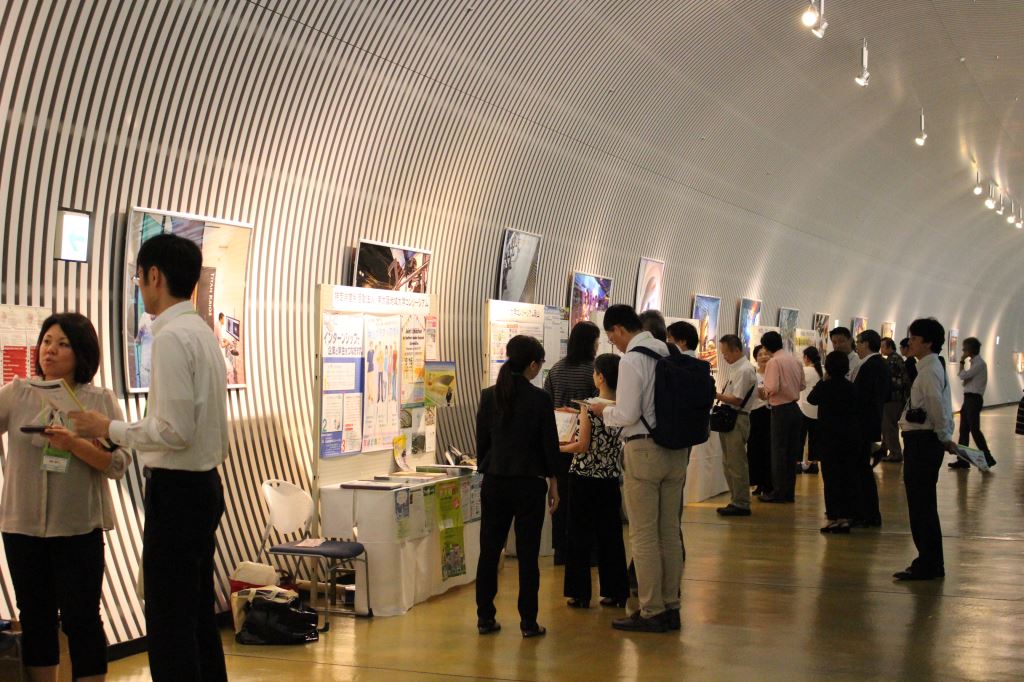
On the second day, five subcommittees were held covering a variety of themes, including “Sustainable development and environmental law and policy,” “Human resource development through volunteerism,” “From industry-academia collaboration to co-creation,” “Community contribution and volunteering,” and “Current situation and outlook for training student volunteers who can be active in times of disasters – Case studies of disaster prevention education efforts in Kyoto and Akita.” Practical case studies were reported and participants exchanged opinions.
- ▽Scenes from the subcommittees (5 in total)
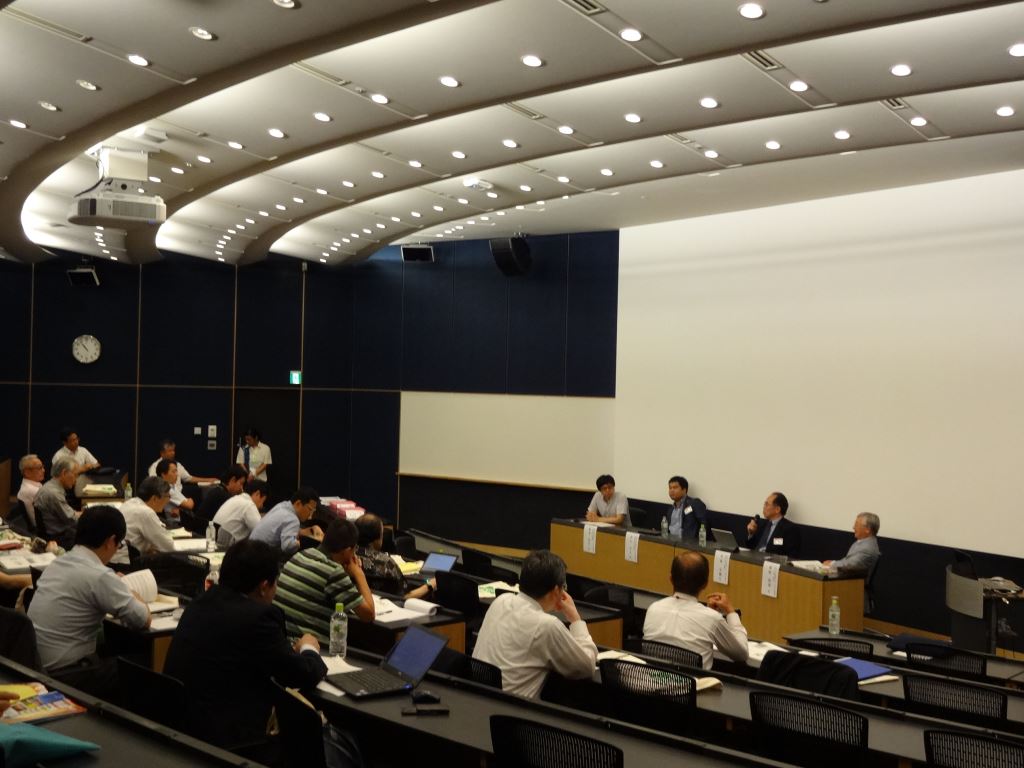
The next, 15th forum is scheduled to be held in Hakodate in September 2018. Details will be posted on the University Consortium Kyoto website as soon as they are decided.
We look forward to your participation.














